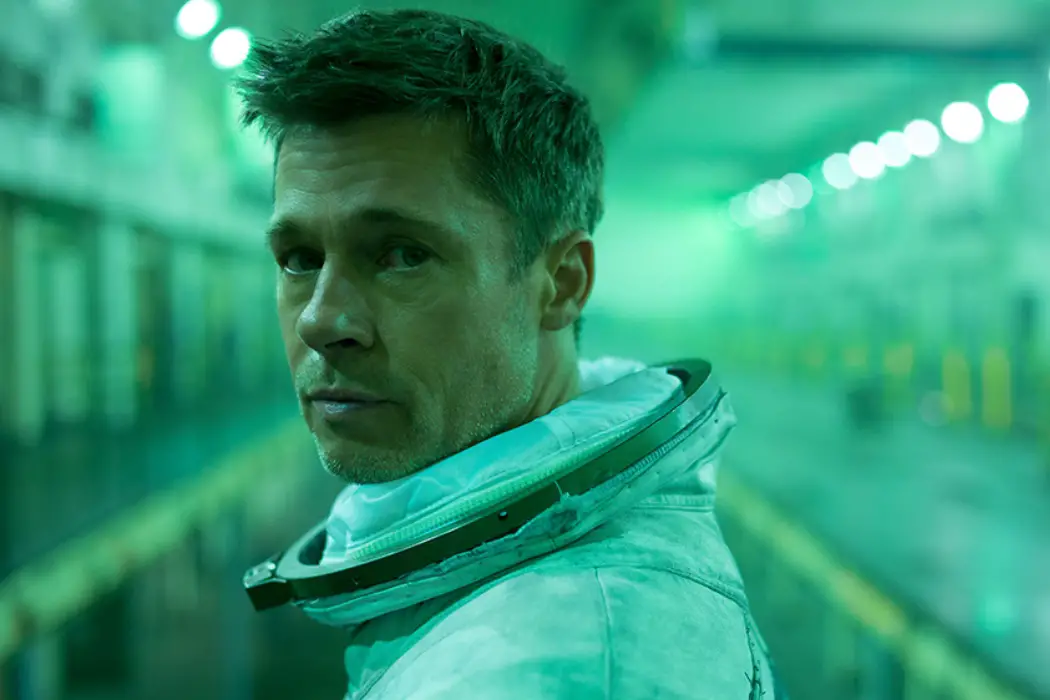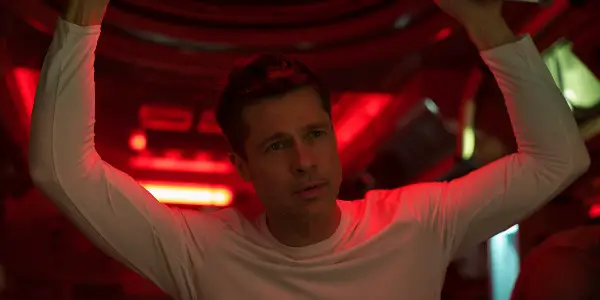Venice International Film Festival 2019: AD ASTRA

22. Film Critic and Journalist. Lover of Digital and Celluloid
James Gray’s mysterious and enigmatic Ad Astra, which did not have a trailer or a solid release date even a mere few months ago, had its world premiere at the 76th Venice Film Festival. The long-anticipated sci-fi epic follows Brad Pitt, hot off the heels of his second collaboration with Quentin Tarantino, as Roy McBride, who is sent on a classified mission to the edge of the solar system to act as a delegate to find and communicate with his long thought to be dead father, Clifford McBride (Tommy Lee Jones) who has mysteriously reappeared after almost three decades searching for extraterrestrial life.
Ad Astra is about as close to a Terrence Malick feature without being directed by the man himself. The Malickian tone and aesthetics are ingrained into this feature with a coaxed use of narration employed by Pitt’s character to evoke all of his internal monologue external. In specific sequences, such an exercise works well to progress the narrative of the film without a need for unnecessary subplots or overly abundant exposition, but the film, much like Malick’s work, ultimately drowns in excessive provision for the audience who are led by a ball and chain with constant inclination of what this character thinks or feels. Never left to ponder or think for themselves.
Stunning Score and Visuals
The concept of loneliness or extreme isolation, completely alone with one’s thoughts and demons in a position as claustrophobic as deep space is what informs most of Ad Astra‘s story. It is all smartly dressed up and two-thirds of the way completed, but it isn’t enough to convince. The theme is repetitive, the execution is slow and the narrative lacks depth, which tires and frustrates.

A tantalising score by Max Richter and Lorne Balfe and glorious visuals from cinematographer Hoyte Van Hoytema can only sustain the audience for so long with surface-level ideas. Undoubtedly the visual and audio elements of this feature are staggering, but sadly can’t elevate the film as a whole. Once the film tries to dig a little deeper and explore themes and open up character development, it loses its drift.
For starters, while Pitt is brilliant throughout, he never gets to explore the physiological strain through his superb physicality. Only a number of sequences allow him to stretch his acting muscles, namely the final act of which he demonstrates a masterclass of emotional conviction. He demonstrates his ability to shift from action star to dramatic actor in a heartbeat. His depiction of internal torment is superb, but his construction of isolation is the more compelling stuff.
Pitt is extraodrinary
Blink, and you will miss the performances by Donald Sutherland and Ruth Negga. They go amiss to inject layers and poignancy to the overall plot, but it is the performance of Liv Tyler that leaves most to be desired – not out of a problematic or defunct execution, purely out of the strictly disappointing usage of such an actor’s time. One or two lines and then left as background noise to indicate a morbid feeling of regret and animosity within Pitt’s character. Granted, it is that very emotional turmoil that informs most of the film but only when it is convenient to push the story, rather than organically explore the topic.

While the relationship between father and son is emphasised upon throughout, the story of the relationship between husband and wife is confusingly, underwhelmingly neglected. One could argue that it is not necessarily integral to the overarching narrative, however, the film is an exploration of the merits of humanity overall, which leads to the climactic payoff being both underwhelming and arbitrary.
Ad Astra: A Surface Level Approach
Thankfully the Nolan-esque demand for scientific accuracy and blinding audiences with the overly convoluted conviction of such practices has been limited to almost a minimal approach. Gray and production designer Kevin Thompson created a vibrant and not overly visually conscious world, serving its purpose seamlessly in the background. Ad Astra is no doubt visually stimulating in composition and framing, but ultimately James Gray’s film is a meandering lifeless existential entity that overly emphasises on simplicity.
What are your thoughts on Ad Astra? Is it a Malick like homage or a sci-fi masterpiece? Let us know in the comments below!
Watch Ad Astra
Does content like this matter to you?
Become a Member and support film journalism. Unlock access to all of Film Inquiry`s great articles. Join a community of like-minded readers who are passionate about cinema - get access to our private members Network, give back to independent filmmakers, and more.













